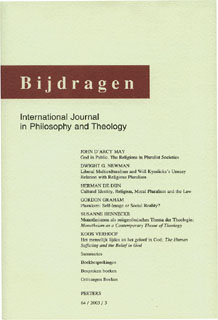 previous article in this issue previous article in this issue | next article in this issue  |

|
Document Details : Title: Der Stand der Gottesfreunde Subtitle: Zu Philos Schrift 'Über die kontemplative Lebensform' Author(s): BERGMEIER, Roland Journal: Bijdragen Volume: 63 Issue: 1 Date: 2002 Pages: 46-70 DOI: 10.2143/BIJ.63.1.796 Abstract : Usually scholars’ interest in Philo’s De vita contemplativa is limited to the so-called Therapeutae as a distinctive group or community of Jewish sectarians, their identity and character, their Mareotic settlement and ascetic way of life. But Philo himself is not really engaged in ging an account of a historical community, for he writes a philosophical treatise on being wholly devoted to worship and contemplation (contempl 1.58.67.90). That’s why he doesn’t describe, but acutally defines that to qerapeutikon genoz has to be of those who aspire to “the contemplation of the Being” (contempl 11, cf. Plato, Rep. 582c) and in this way obtain complete happiness. At the end of the treatise (§ 90) this idea is taken up again by idealizing words about being true philosophers, i.e. to be friends of God, a gift of God that affords true virtue and leads to the height of happiness. Philo presents the contemplative manner of living by telling of the so-called Therapeutae. While doing so he uses different traditions and sources by means of which that community sometimes appears as a matter of history: – remarks that actually refer to Jewish life and institutions in general – the source on the Essenes, which he already used when writing Every Good Man Is Free 75-91 and Hypothetica 11.1-18 – another source on the Essenes, not used before, but also known to Josephus and Pliny, not Pythagorean, of course, but shaping the Essenes in a Pythagorean perspective. The common features of the Therapeutae and the Essenes are thus Philo’s version of the matter, and his Therapeutae are the paradigm of the philosophical manner of living that Philo wants to promulgate. Jews, at least the best of them, he wants to say, are those people who are of God’s friendship spending all their virtuous life in meditation and worship (contemp 58.90; cf. praem 43-44). |
